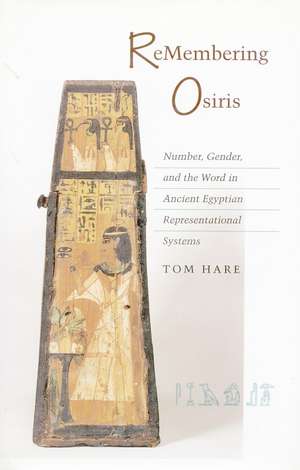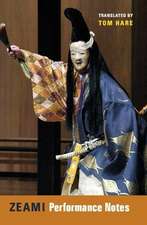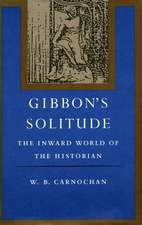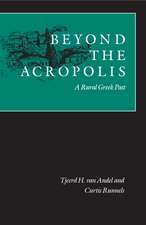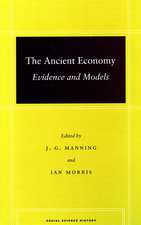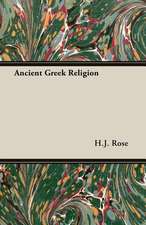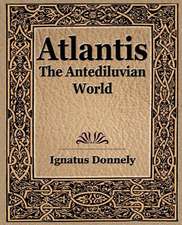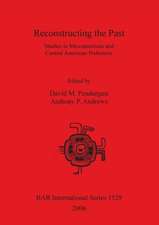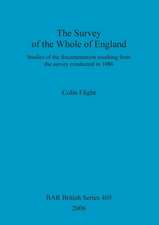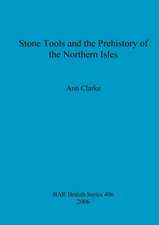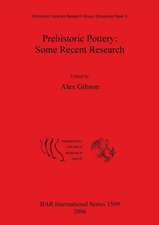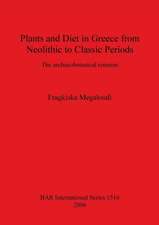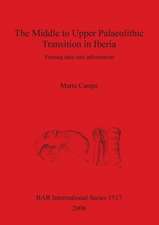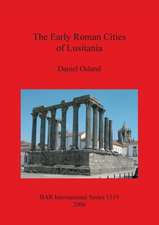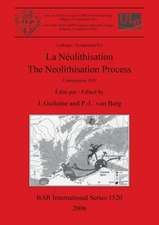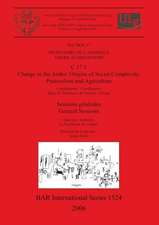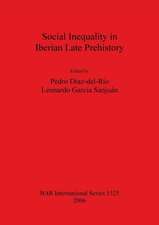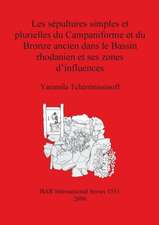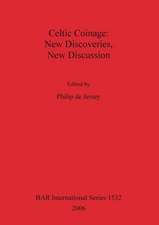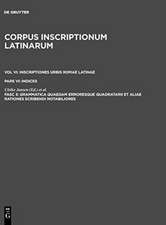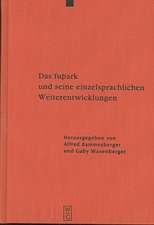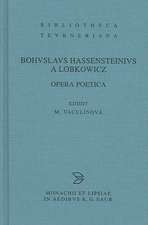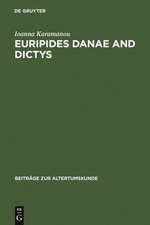ReMembering Osiris: Number, Gender, and the Word in Ancient Egyptian Representational Systems
Autor Tom Hareen Limba Engleză Hardback – 31 mai 1999
The texts and visual arts of ancient Egypt reveal a persistent and sophisticated engagement with problems of language, the body, and multiplicity. This innovative book shows how these issues were represented in ancient Egypt and how Egyptian approaches to them continue to influence the way we think about them today.
The story of Osiris is one of the central cultural myths of ancient Egypt, a story of dismemberment and religious passion that also exemplifies attitudes about personal identity, sexuality, and the transfer of royal power. It is, moreover, a story of death and the overcoming of death, and in this it lies at the center of our own means of engagement with ancient Egypt.
This book focuses on the story of Osiris as it is recorded in Egyptian texts and memorialized on the walls of temples and tombs. Since such a focus is attainable only through Egyptian representational systems, especially hieroglyphs, the book also engages broader questions of writing and visual representation: decipherment, controversies about the “ideograph,” and the relation between visual images and writing.
This analysis of Egyptian representation leads to a consideration of the phallic body and the problem of multiplicity in Egyptian religion, two nets of Egyptian discourse that, though integrated into the writing system itself, reach toward broader Egyptian discourses of gender, subjectivity, piety, and cosmogenesis. The concluding chapter considers, in specific terms, the question of a persisting Egyptian legacy in the West, from the Greeks and Israelites to Augustine, Hegel, and Lacan.
The story of Osiris is one of the central cultural myths of ancient Egypt, a story of dismemberment and religious passion that also exemplifies attitudes about personal identity, sexuality, and the transfer of royal power. It is, moreover, a story of death and the overcoming of death, and in this it lies at the center of our own means of engagement with ancient Egypt.
This book focuses on the story of Osiris as it is recorded in Egyptian texts and memorialized on the walls of temples and tombs. Since such a focus is attainable only through Egyptian representational systems, especially hieroglyphs, the book also engages broader questions of writing and visual representation: decipherment, controversies about the “ideograph,” and the relation between visual images and writing.
This analysis of Egyptian representation leads to a consideration of the phallic body and the problem of multiplicity in Egyptian religion, two nets of Egyptian discourse that, though integrated into the writing system itself, reach toward broader Egyptian discourses of gender, subjectivity, piety, and cosmogenesis. The concluding chapter considers, in specific terms, the question of a persisting Egyptian legacy in the West, from the Greeks and Israelites to Augustine, Hegel, and Lacan.
| Toate formatele și edițiile | Preț | Express |
|---|---|---|
| Paperback (1) | 264.68 lei 3-5 săpt. | |
| Stanford University Press – 30 iun 1999 | 264.68 lei 3-5 săpt. | |
| Hardback (1) | 889.30 lei 6-8 săpt. | |
| Stanford University Press – 31 mai 1999 | 889.30 lei 6-8 săpt. |
Preț: 889.30 lei
Preț vechi: 1154.93 lei
-23% Nou
Puncte Express: 1334
Preț estimativ în valută:
170.17€ • 178.12$ • 141.63£
170.17€ • 178.12$ • 141.63£
Carte tipărită la comandă
Livrare economică 01-15 aprilie
Preluare comenzi: 021 569.72.76
Specificații
ISBN-13: 9780804731782
ISBN-10: 0804731780
Pagini: 344
Dimensiuni: 127 x 203 x 30 mm
Greutate: 0.66 kg
Ediția:1
Editura: Stanford University Press
Colecția Stanford University Press
ISBN-10: 0804731780
Pagini: 344
Dimensiuni: 127 x 203 x 30 mm
Greutate: 0.66 kg
Ediția:1
Editura: Stanford University Press
Colecția Stanford University Press
Recenzii
"Hare's book is the first postmodern treatment of ancient Egypt, meaning an approach that is highly subjective, reflexive, ironic, ludic, eclectic, reconstructive, imaginative, and creative. Notwithstanding his being a specialist in early Japanese literature, Hare's knowledge of ancient Egypt, Egyptian grammar, and the professional literature is excellent. No Egyptologist, however, would have been able to cast such a fresh and uninhibited look at Egyptian texts and Egyptological theories and interpretations." —Jan Assmann,University of Heidelberg
Notă biografică
Tom Hare is Associate Professor of Japanese and Comparative Literature at Stanford University. He is the author of Zeami's Style: The Noh Plays of Zeami Motokiyo (Stanford, 1986).
Textul de pe ultima copertă
“Hare’s book is the first postmodern treatment of ancient Egypt, meaning an approach that is highly subjective, reflexive, ironic, ludic, eclectic, reconstructive, imaginative, and creative. Notwithstanding his being a specialist in early Japanese literature, Hare’s knowledge of ancient Egypt, Egyptian grammar, and the professional literature is excellent. No Egyptologist, however, would have been able to cast such a fresh and uninhibited look at Egyptian texts and Egyptological theories and interpretations.” —Jan Assmann,University of Heidelberg
Descriere
The texts and visual arts of ancient Egypt reveal a persistent and sophisticated engagement with problems of language, the body, and multiplicity. This innovative book shows how these issues were represented and how Egyptian approaches to them continue to influence the way we think about them today.
